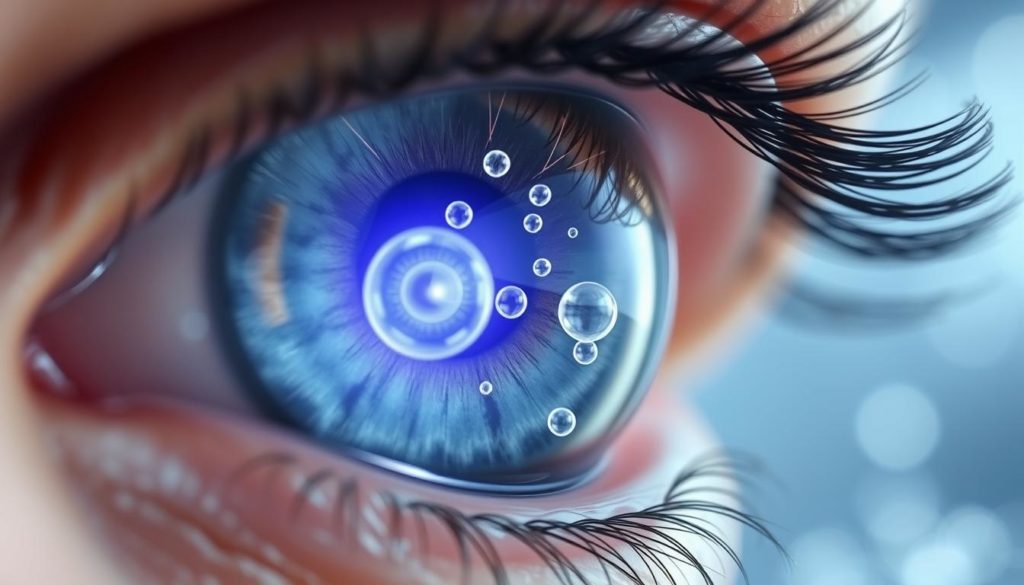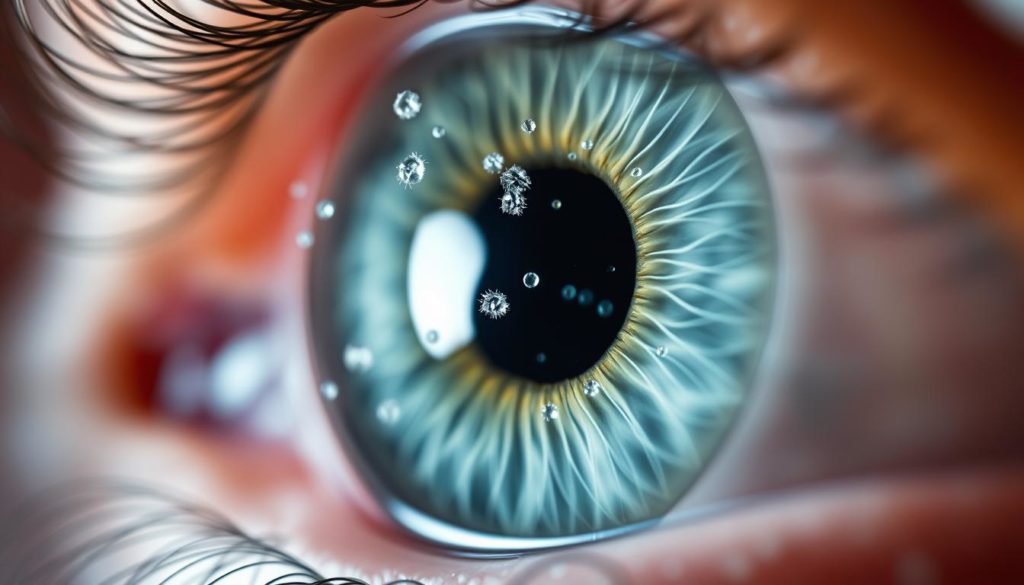Did you know that 70% of people aged 50 and above experience eye floaters? These tiny, shadowy figures that drift across your field of vision can be more than just a nuisance; they can indicate underlying health issues that require attention.
Understanding what causes eye floaters and exploring effective eye floaters treatment options is crucial for maintaining optimal eye health. This article will dive into the various causes, diagnostic methods, and treatments for this common visual disturbance. Whether you’re seeking natural remedies or wondering how to treat eye floaters medically, we’ve got you covered.
Understanding Eye Floaters
Eye floaters are tiny specks or lines that seem to drift in your field of vision. They often look like dark spots, threads, or spider-like webs. These floaters move with your eyes, making them seem to dart away when you try to look at them.
Understanding eye floaters means looking into their causes and symptoms.

What Are Eye Floaters?
Eye floaters are small groups of cells or protein floating in the vitreous humor. This is the clear, gel-like substance in your eye. They cast shadows on the retina, making you see them as specks or threads.
Knowing what causes eye floaters can help you tell normal ones from those that need medical help.
Common Symptoms of Eye Floaters
The symptoms of eye floaters can vary. But some common signs include:
- Dark spots or specks that drift when the eyes move
- Thread-like strands or cobwebs that float across the visual field
- Flashes of light accompanying the floaters
- The appearance of shadows or shapes that dart away when looked at directly
These symptoms usually come from aging or changes in the vitreous humor. Knowing how to manage eye floaters can help you feel better and reduce worry. If your symptoms are severe or get worse suddenly, see an eye specialist to check for any serious issues.
Primary Causes of Eye Floaters
Eye floaters are common as we age. Knowing the main causes helps in finding natural ways to prevent them. Let’s explore the main reasons for these visual disturbances.

Natural Aging Process
The aging process is the top reason for eye floaters. As we get older, the gel-like substance in our eyes, called vitreous humor, changes. It starts to liquefy and shrink, leading to clumps or strands of collagen. These cast shadows on the retina, making us see floaters.
While usually harmless, it’s important to watch for any changes. If you notice something different, try natural remedies for eye floaters.
Eye Injuries and Trauma
Eye injuries and trauma can also cause eye floaters. Direct impacts or injuries can let debris into the vitreous humor. This results in floaters.
Wearing the right eyewear is key in preventing eye floaters. It’s important to protect your eyes during risky activities.
Underlying Health Conditions
Eye floaters can also be caused by health conditions. Diabetic retinopathy, uveitis, tumors, and retinal tears or detachments are examples. Managing your health and addressing these conditions is crucial.
It helps in reducing the risk and ensuring effective prevention of eye floaters.
Eye Floaters Causes and Treatment
Eye floaters are common and can be a nuisance. They look like small specks or clouds in your vision, especially on bright backgrounds. Knowing what causes them helps find the right treatment. This section will cover the main reasons for eye floaters and the medical treatments available.
There are several reasons why people get eye floaters. The main ones are:
- Natural Aging Process: As we get older, the vitreous in our eyes changes. It liquefies and shrinks, causing floaters.
- Eye Injuries and Trauma: Eye injuries can make the vitreous detach from the retina. This leads to floaters.
- Underlying Health Conditions: Conditions like diabetes or high blood pressure can also cause eye floaters.
To find out why you have eye floaters, you need a proper diagnosis. An eye floaters diagnosis is key. An ophthalmologist can do a thorough eye exam to find the cause and suggest treatment.
For medical treatment for eye floaters, there are a few options:
| Treatment Option | Description |
|---|---|
| Vitrectomy | A surgical procedure where the vitreous gel is removed and replaced with a saline solution. |
| Laser Therapy | Uses a laser to break up floaters, making them less noticeable. |
Each treatment has its own benefits and risks. A professional eye exam is needed to choose the best option for you. The next sections will go into more detail about diagnosis and treatment options.
How to Diagnose Eye Floaters
Seeing eye floaters can be surprising. It’s key to get a full eye health evaluation. Finding out what causes eye floaters takes several steps and tests.
Professional Eye Examination
The first step is a professional eye check. This includes tests to see how well you can see at different distances. You’ll also get eye drops to widen your pupils.
This lets the doctor see the back of your eyes. They can check the retina and vitreous humor, where floaters are found.
Diagnostic Tests and Imaging
After the first check, more tests and images might be needed. These help understand eye floaters better. Tests include:
- Ultrasound Imaging: It looks at the vitreous and retina, great for seeing bleeding.
- Optical Coherence Tomography (OCT): It gives detailed images of the retina.
These images help the doctor figure out what’s causing the floaters. They then plan the best treatment. Regular eye health evaluations and quick diagnosis of eye floaters are vital for good vision.
Medical Treatments for Eye Floaters
If you’re dealing with eye floaters, there are several medical treatments that can help. We’ll look at two main options: vitrectomy and laser therapy.
Vitrectomy
Vitrectomy is a effective treatment for eye floaters. It’s a surgery where the vitreous humor, the gel in your eye, is removed. It’s replaced with a saline solution.
Benefits:
- Immediate relief from floaters.
- Improved overall vision.
Risks and Side Effects:
- Risk of retinal detachment.
- Possible cataract formation.
- Infection risk, although minimal with proper care.
Laser Therapy
Laser therapy, or laser vitreolysis, is another effective treatment for eye floaters. It uses a laser to break up the floaters, making them less noticeable.
Benefits:
- Non-invasive procedure.
- Lower risk compared to vitrectomy.
- Quick recovery time.
Considerations:
- Not always suitable for all types of floaters.
- Multiple sessions may be needed.
- Possible complications could include lens damage.
When choosing between vitrectomy and laser treatment for eye floaters, consider your options. Both treatments have shown to be effective in reducing floaters and improving vision.
| Treatment | Benefits | Risks |
|---|---|---|
| Vitrectomy |
|
|
| Laser Therapy |
|
|
Natural Remedies for Eye Floaters
Managing eye floaters naturally is effective with the right nutrition and hydration. These methods support eye health and may reduce floaters.
Diet and Nutrition
Good nutrition is key for eye health. Vitamins A, C, and E, and omega-3 fatty acids are essential. Eating foods like leafy greens, carrots, and fish boosts eye health.
- Carrots: High in beta-carotene, which the body converts into vitamin A.
- Leafy Greens: Sources of lutein and zeaxanthin, known to support eye health.
- Fish: Rich in omega-3 fatty acids, beneficial for the retina.
Hydration and Eye Health
Hydration is crucial for eye care. It helps keep the vitreous humor healthy, which manages floaters. Drinking water and eating hydrating foods like cucumbers and watermelons is good for your eyes.
- Cucumbers: Composed of about 95% water, great for staying hydrated.
- Watermelons: Besides being hydrating, they’re also rich in vitamins A and C.
| Nutrient | Food Source | Benefits for Eye Health |
|---|---|---|
| Vitamin A | Carrots, Sweet Potatoes | Supports night vision and overall eye health |
| Omega-3 Fatty Acids | Fish, Flaxseeds | Reduces inflammation and supports retina health |
| Antioxidants | Leafy Greens, Berries | Protects eyes from oxidative damage |
| Hydration | Water, Cucumbers | Maintains optimal eye function and reduces floaters |
Prevention Strategies for Eye Floaters
Effective prevention strategies can greatly help in minimizing risk of eye floaters. One important tip is to wear sunglasses to protect your eyes from UV rays. This simple step can prevent damage to your eyes’ internal parts.
It’s also crucial to avoid activities that could harm your eyes. For example, wearing proper eye protection during sports or risky tasks can prevent injuries. This helps in minimizing risk of eye floaters.
Regular eye exams are key for early detection and management of eye issues. Make sure to visit your optometrist regularly for thorough eye check-ups. Early detection through these exams can greatly lower the risk of eye floaters.
Here are some practical eye floaters prevention tips:
- Wear UV-protective sunglasses.
- Use protective gear during high-risk activities.
- Schedule regular eye examinations.
- Maintain a healthy diet rich in vitamins and antioxidants.
How Lifestyle Choices Impact Eye Health
Good vision isn’t just about regular eye exams. Our daily habits are key. Knowing how exercise, diet, and activities affect our eyes helps us stay healthy.
Exercise and Physical Activity
Exercise is great for our hearts and muscles. It also boosts eye health. Activities like jogging, swimming, and yoga improve blood flow to the eyes.
This ensures more oxygen and nutrients reach the eyes. It lowers the risk of eye problems and floaters.
Smoking and Alcohol Consumption
Smoking harms eye health a lot. It raises the risk of cataracts, macular degeneration, and uveitis. Smoking slows down blood flow to the retina, leading to vision loss.
Drinking too much alcohol also hurts the eyes. It causes blurred vision and nutritional problems. Cutting down on smoking and alcohol is vital for eye health.
| Activity | Positive Effects | Negative Effects |
|---|---|---|
| Regular Exercise | Improves circulation, reduces eye pressure, and delays age-related conditions. | Over-exertion without proper form can cause eye strain. |
| Smoking | None | Increases risk of cataracts, macular degeneration, and other conditions. |
| Alcohol Consumption | Moderate consumption may offer cardiovascular benefits. | Excessive intake leads to nutritional deficiencies and toxic amblyopia. |
When to See a Doctor
Knowing when to get eye floaters medical advice is key for eye health. While most floaters are not a problem, some symptoms need quick action. If you see more floaters suddenly, or light flashes, or if your vision changes, see a doctor right away.
“If you notice these changes, it might indicate retinal detachment or other serious conditions that can threaten your vision.”
- Sudden increase in floaters
- Presence of light flashes
- Partial or total vision loss
If you’re seeing these signs, it’s time to talk to an eye doctor. They can check your eyes and treat any problems. This could stop serious eye damage later on.
| Symptoms | Potential Conditions | Recommendation |
|---|---|---|
| Sudden increase in floaters | Possible retinal detachment | Consult an eye care professional |
| Light flashes | May indicate retinal tear | Seek immediate medical advice |
| Vision loss | Could be a sign of serious condition | Get prompt eye floaters medical advice |
Your eyes are precious. Pay attention to any changes and act fast. If you’re not sure, it’s better to be safe and see an eye doctor.
FAQ on Eye Floaters Causes and Treatment
Eye floaters can be confusing, leading to many questions. We’ll answer some common ones to help you understand them better.
1. What exactly are eye floaters?
Eye floaters are tiny spots or threads that move in your vision. They’re more visible against bright backgrounds, like the sky or a white wall.
2. Are eye floaters a sign of a serious condition?
Usually, eye floaters are just a sign of aging and not a big health problem. But, if you see more floaters or flashes, see an eye doctor to check for serious issues.
3. Can eye floaters be treated?
Yes, treatments like vitrectomy and laser therapy are available for severe cases. These are recommended when floaters really bother your vision.
4. Do lifestyle changes affect eye floaters?
Yes, healthy choices can improve your eye health and reduce floaters. Eating right, staying hydrated, and exercising regularly are key steps.
“Understanding eye floaters means knowing they’re usually harmless. But, any sudden changes need an eye specialist’s check.”
5. How can I prevent eye floaters?
While you can’t stop eye floaters completely, good eye care can help. Wear sunglasses to protect your eyes from UV light and stay healthy to reduce their chance.
These answers aim to clear up common misunderstandings about eye floaters. Always talking to an eye care professional is a smart move when you have eye concerns.
Conclusion
Understanding eye floaters is key to keeping your eyes healthy. They often come with age but can also happen due to injuries or health issues. Knowing the signs and when to see a doctor is important.
Treatment varies from surgery to natural methods like diet and staying hydrated. We talked about how important eye exams and tests are. A healthy lifestyle and avoiding bad habits can help keep your vision sharp.
Managing eye floaters means knowing what to do and when. We’ve shared tips to help you keep your eyes in top shape. If floaters bother you a lot, see a doctor to find the right treatment for you.
FAQ
What are eye floaters?
Eye floaters are tiny specs or threads that move in your vision. They are shadows from clumps of gel or cells in the vitreous. The vitreous is the clear gel inside your eye.
What causes eye floaters?
Floaters often come from age changes in the vitreous. As you get older, the vitreous can become more liquid. This leads to clumps that cast shadows on the retina.
Eye injuries, health issues like diabetic retinopathy, inflammation, and retinal tears can also cause them.
How can eye floaters be diagnosed?
Eye care professionals diagnose floaters through eye exams. They use visual acuity tests and dilated exams. Sometimes, ultrasound imaging is used to understand the cause and severity.
What are common symptoms of eye floaters?
Symptoms include seeing dark spots, threads, or webs that move with your eyes. These seem to dart away when you try to look at them directly.
Are there natural remedies for eye floaters?
Yes, some dietary and lifestyle changes can help. Eating foods rich in antioxidants and vitamins, staying hydrated, and taking care of your eyes are beneficial.
What medical treatments are available for eye floaters?
Treatments include vitrectomy and laser therapy. Vitrectomy removes the vitreous and replaces it with saline. Laser therapy breaks up the floaters.
Can eye floaters be prevented?
While prevention is not always possible, you can reduce risk. Protect your eyes, eat healthy, stay hydrated, and get regular eye exams.
When should I see a doctor about my eye floaters?
See an eye care professional if you notice more floaters, flashes of light, or vision loss. These could be signs of serious conditions.
How do lifestyle choices impact eye floater development?
Choices like regular exercise and avoiding smoking can help your eye health. They may reduce the risk of floaters.
Are eye floaters a common part of aging?
Yes, floaters are common with aging. As the vitreous changes with age, floaters become more noticeable.


